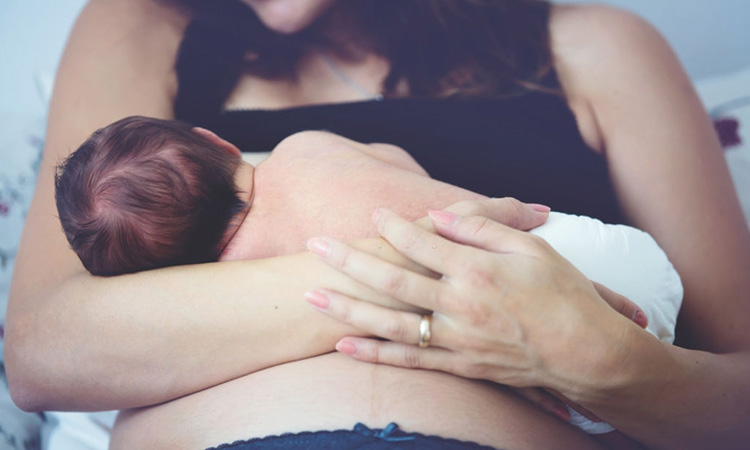Breastfeeding means feeding your infant breast milk, straightforwardly from your breast. It’s also termed nursing. Since olden times, people have learnt the power of breastfeeding in children. However, there are several benefits of breastfeeding for moms as well associated with their maternal health.
As a woman’s breast milk is planned explicitly to support a newborn child’s body, the creation and conveyance of this milk help improve the mom’s wellbeing. Numerous medical specialists and doctors unequivocally suggest breastfeeding solely for a half year. During this time, a woman matures both physically and emotionally from the relationship she shares with her infant.
Read on further to know about all the benefits of breastfeeding for moms in detail:
Why Is Breastfeeding Important?
Breastfeeding is a natural physiological period. In any case, for a few, it is an ability that moms and children need to rehearse and may require help with. It requires the consolation and backing of families, and wellbeing carers.
Breastfeeding moms getting back to work likewise require support from their bosses and offices. While breastfeeding gives babies the best beginning for a good life, there are many emotional benefits of breastfeeding for mothers and children as well.
With time, you will discover different financial and environmental advantages of breastfeeding for the entire family and society. Breastfeeding boosts the levels of oxytocin in the body. The hormone promotes your uterus to go back to its original size. Breastfeeding consumes additional calories, so it can assist you with losing pregnancy gains quicker.
The best fact is that this practice brings down the danger of breast and cancerous ovarian growth. It might bring down your chances of developing osteoporosis at a later age.
There are several consequences of not breastfeeding too. Ladies who don’t breastfeed are at more serious danger for diabetes, osteoporosis, breast, ovarian, and endometrial malignant tumors. Thus, all healthcare workers should energize, uphold, and encourage breastfeeding.
Top 10 Benefits Of Breastfeeding For Moms
We have often advocated the benefits of breastfeeding for an infant, but breastfeeding is not just important for the optimum growth and development of the babies. Breastfeeding is equally important for new mothers. Let us know more about benefits of breastfeeding for moms.
1. Breastfeeding may help you lose weight

Our panel gynaecologist Dr Ankita Patel Tayal says that the significant benefit of breastfeeding for moms is that they are bound to lose a chunk of their pre-pregnancy gains than moms who formula feed. Breastfeeding lessens the danger of long-term obesity. As per research on US Women, it was found that breastfeeding consumes more calories, and after increased breastfeeding—in any event, a half year—can assist moms with shedding pounds of weight.
Nonetheless, weight reduction is a prime factor among lactating ladies; observing the eating regimen and increasing physical activity, and working-out are more reliable methods of getting thinner.
Your body invests a ton of energy into topping off your breasts with supplement rich milk, consuming upward of 500 calories every day simultaneously. Moreover, research suggests breastfeeding additionally improves your glucose digestion and insulin , or, in other words, it helps your body transform the food into fuel for your baby.
2. Breastfeeding helps the uterus shrink
Moms who breastfeed tend to heal from labor pains and discomfort without any problem. During pregnancy, your uterus develops hugely, extending from the size of a pear to occupying nearly the whole space of your mid-region. After conveyance, your uterus experiences a cycle called involution, which causes it to shrink back to its past size.
The main importance of breastfeeding is that it discharges a hormone considered oxytocin. It causes the uterus, which gets loosened up during pregnancy, to shrink back to its typical size all the more rapidly.
As per research, breastfeeding discharges oxytocin and prolactin, hormones that loosen up the mother a bit, making her uterus contract. They help them to change back old to its typical size all the more rapidly and diminishing bleeding.
Pitocin, an engineered hormone used to make the uterus contract during and after work, is fundamentally displayed on oxytocin. Studies have also demonstrated that moms who breastfeed commonly have reduced blood loss after the uterus’ birth and quicker involution.
3. Lower risk for postpartum depression
Postpartum depression (PPD) is a sort of sadness and depression-like condition that can grow not long after labor. Ladies who breastfeed are less inclined to be discouraged than moms who can’t.
Be that as it may, it’s not satisfactory, which starts things out, breastfeeding troubles, or a depressed state of mind. Specialists are sure that breastfeeding discharges oxytocin to help move milk out of the bosom, lessen feelings of anxiety, and promote bonding between the mother and the infant — all these are the benefits of breastfeeding for moms and children.
In the interim, low oxytocin levels are connected to sorrow and indicate breastfeeding troubles. According to conducted research, ladies who breastfeed their newborn children had scores demonstrating not so much nervousness but rather more commonality than the ladies bottle-taking care of their babies. Some research recommends that moms who breastfeed their infants have fewer scenes of post-delivery wretchedness.
Breastfeeding ladies report mental advantages, for example, expanded self-assurance and a more grounded feeling of association with their infants. Numerous social orders and societies likewise urge moms to breastfeed, which can offer help to another mother.
4. Lowered risk of diabetes
Studies show that breastfeeding builds insulin affectability and improves glucose digestion in the mother. It decreases the danger of creating Type 2 diabetes, especially among ladies who develop gestational diabetes during pregnancy.
The most recent investigation adds to confirm that nursing ensures against type 2 diabetes. Also, it is likely because lactation makes cells more sensitive to the hormone insulin. (Indeed, diabetic moms who bosom feed generally require less insulin when they nurture.) It could likewise be because of breastfeeding’s impact on where fat is put away: on the hips and thighs instead of on the stomach.
An overabundance of stomach fat frequently obtained during pregnancy is a crucial factor in grown-up diabetes. Exclusive breastfeeding may lessen the danger of frailty by postponing the monthly cycle’s arrival for 20 to 30 weeks and thus, it diminishes the threat of anaemia.
5. Reduces risk of a heart disease

In 2010, Specialists found that ladies who breastfed for two years throughout their reproductive period had a 23% lower danger of forming any coronary illness. While the explanation is unclear, analysts guess that it so happens maybe because of the useful impacts that nursing has on the body’s digestion of sugar and fats.
Nursing may likewise diminish accustomulated fat—the risky kind that gathers around the stomach organs—and advance more beneficial fat stockpiling on the hips and thighs.
One thing nursing doesn’t seem to do: trigger weight reduction. While it takes a lot of calories to create bosom milk, nursing mothers, for the most part, find that their hunger increments, making them eat more.
Another research in 2017 found that ladies who breastfed had a 9% lower possibility of creating coronary illness than ladies who didn’t breastfeed. Breastfeeding more than one kid, and doing it for a very long time or more, seemed to convey much more considerable defensive advantages, despite the fact that the examination just demonstrates a relationship, not causation.
6. Breastfeeding may prevent menstruation
Continued breastfeeding delays ovulation and periods. The suspension of periods may be nature’s method of guaranteeing there’s some time between pregnancies.
You may think about this change as an additional advantage. Studies suggest, it happens because the hormone that makes your milk – prolactin, also prevents you from ovulating and having your period. On the off chance that you are breastfeeding day and night, it tends to be as long as a year prior to your period returns.
There are numerous variables that decide when your period will restore when you are breastfeeding. These include:
- How frequently do you bottle-feed your child?
- How your body reacts to hormone changes?
- What is the total time for your child to breastfeed?
7. Breastfeeding saves money
Breast milk is consistently at the correct temperature and always ready for the baby to drink. You do not have to buy formula containers and feeding bottles and sterlisers – to name a few. The expense can add up to in excess of thousands of rupees during a child’s initial year of life owing to different diseases, as indicated by certain researches. Families set aside cash by lessening the requirement for containers and equations.
Since breastfed infants are healthier, their moms miss less work and invest less energy and cash on paediatric consideration. Households also lessen medical services expenses spent on doctor office visits, medicines, over the counter medication purchases and hospitalizations.
8. Lessened risk of ovarian cancers

It is well-known that nursing your baby also brings down the mother’s lifetime danger of ovarian and endometrial malignant growth.
Presumably, it reduces ovulation and the ovulatory hormones so as to help in nurturing fully.
Yet, analysts have discovered that mothers who breastfeed end up with more significant levels of extraordinary antibodies to a protein found in ovarian disease cells. This implies breastfeeding seems to develop your protection from the infection, similar to a vaccination.
9. Breastfeeding reduces the risk of breast cancer
Among premenopausal and postmenopausal ladies, the danger of breast cancer declined with an expanding span of lifetime lactation experience despite the fact that the impact was reliably more grounded for premenopausal ladies.
Parity and term of breastfeeding likewise affected the danger of breast cancer. Contrasted with parous ladies who never breastfed, ladies breastfed for a long time had a lower relative danger.
Ladies who were breastfed as newborn children, regardless of whether just for a brief time frame, demonstrated a surmised 24% lower danger of creating premenopausal or postmenopausal breast cancer, contrasted with ladies who were fed with a bottle as a baby. Breastfeeding is related to hormonal changes and adjustments in sub-atomic histology in the bosom. This may decrease a mother’s breast cancer hazard.
10. Breastfeeding helps birth spacing
Since breastfeeding defers ovulation, the longer a mother breastfeeds, the more she can rehearse regular child spacing. How long a lady stays, sterile relies upon her baby’s breastfeeding pattern and her own individual infant.
In societies where incessant or delayed breastfeeding is normal, baby blues amenorrhea and smothered ovulation are regular and serve to space births. It is this spacing of births that prompts decremented newborn and maternal bleakness and mortality.
In agricultural nations, selective breastfeeding lessens all out likely fruitfulness as much as any remaining current preventative techniques. By spacing births, breastfeeding permits the mother to recover before she tries once more for a child.
Ideal birth spacing is in any event two years, ideally 3-5 years. In populaces that exercise ideal breastfeeding, the effect of breastfeeding on ripeness normally results in around two years of birth spacing, all things considered.
This implies that numerous ladies who are breastfeeding will, in any case, encounter not exactly the base suggested birth spans. The Indian ladies who breastfed for a very long time, 98% had not conceived before the 6th month’s finish.
Conclusion

Breastfeeding doesn’t need to be win or bust. A few ladies are alright with breastfeeding solely, yet it isn’t the solitary choice. A few mothers incompletely breastfeed, some join breastfeeding and formula feeding, and some use the pump only.
The advantages of breastfeeding are various! That’s why most doctors and health experts suggest it for everybody for as far as might be feasible, excluding clinical issues that forestall it. Breast milk contains antibodies and different components that shield your infant from ailment and constant infection.
It’s the best beginning you can give in case you’re capable. In the event that you discover you can’t breastfeed, keep in mind and heart that a fed and healthy child is the goal. Try not to feel regretful on the off chance that you need to use a formula recipe to take care of your child. Regardless of what decision you make, your medical care group can manage you to the correct strategies and decisions. You have this in your hands!


